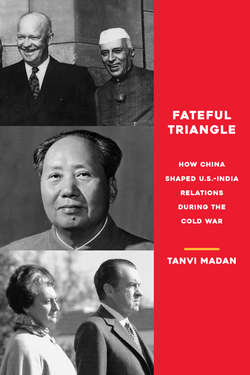Читать книгу Fateful Triangle - Tanvi Madan - Страница 6
На сайте Литреса книга снята с продажи.
Acknowledgments
ОглавлениеThis book’s origin story lies at the Lyndon B. Johnson Library in Austin, Texas. Perusing White House papers, I was struck that officials, including the president, kept mentioning China while discussing India. Much had been written about India-Pakistan hyphenation from that era. But while India-China hyphenation is common in Washington today, there had been little mention of American policymakers viewing India through a China prism during the Cold War. I was intrigued. And I wanted to know if the Johnson administration discussions were a one-off and whether the linkage was one sided; that is, had policymakers in Delhi, too, connected India’s China and US relationships? Those questions started me on a journey toward a doctoral dissertation and eventually this book. It took a village to get me through this voyage, and to its denizens I am eternally grateful.
At the LBJ School of Public Affairs at The University of Texas at Austin, I was fortunate to have a doctoral committee that gave me constructive feedback and support. Frank Gavin, Will Inboden, Mark Lawrence, Jim Steinberg, Jeremi Suri, and Kate Weaver’s guidance greatly enriched this work. Historians, political scientists, and policy practitioners, they gave me the space to pursue research that might not please a disciplinary purist but will hopefully contribute in its own way to the academic and policy worlds. A special thanks to Jim, who has been an adviser, boss, and mentor. He encouraged me to develop an expertise on India, which I had resisted in the quest to be a national security generalist, and challenged me to take on this project, which initially seemed too ambitious.
I cannot say enough about the Brookings Institution, which has been my intellectual and professional home for several years and where I completed this project. Its scholars and staff are not just some of the smartest people I know, but also some of the nicest. I am grateful for their support and scholarship, as well as their friendship. I would particularly like to thank Strobe Talbott and Martin Indyk for showing immense faith in me as a young scholar and for their indispensable support. Bruce Jones, as head of the foreign policy program, has been very supportive of my work. Special thanks also to current and former colleagues Charlotte Baldwin, Megan Bradley, Fiona Hill, Margaret Humenay, Dhruva Jaishankar, Suzanne Maloney, Shivshankar Menon, Anna Newby, Natan Sachs, Kevin Scott, Tamara Wittes, Thomas Wright, and Constantino Xavier. In addition, I am grateful to Purwa Bansod, Neha Aggarwal, Hunter Marston, and Laura McGhee, whose support for the India Project at Brookings allowed me to focus on this book, and to Agni Mishra and Laura Mooney for helping me track down some hard-to-find sources.
This project would not have been possible without the generosity of the Donald D. Harrington Fellows Program and the J. J. “Jake” Pickle Scholarship Program at UT-Austin, the LBJ Foundation, and the Brookings India Initiative Founders Circle. It would also not have been possible without the education that I received and the love for history that I developed thanks to teachers at some outstanding institutions—not just UT-Austin, but also Loreto Delhi, Lady Shri Ram College, and Yale University.
This book has benefited from comments from three external reviewers, my friend and international historian extraordinaire Srinath Raghavan, as well as Mike O’Hanlon, who also shepherded this book through the review process. I am thankful to them, as well as to archivists in Britain, India, and the United States, without whose assistance this would have been a lesser book—and likely a much shorter one. It is also a better manuscript because of the work of the Brookings Institution Press team, to whom I am grateful. My thanks also to Penguin Random House India.
A number of friends, colleagues, and family members made sure that I was not alone on the journey that resulted in this book. They provided advice, feedback, friendship, support, and hospitality, put up with my whining and doubts, and made this endeavor enjoyable. I owe a debt of gratitude to Rashmi, Deepak, and Radhika Appaya; Ridhika Batra, Fred Beach; Madhuri Bhalla; Madhulika Bhattacharya; Emily Brownell; Amanda Cause; Amit Chanda and Urmila Venugopalan; Rudra Chaudhuri, Aysha Chowdhry, Carolyne Davidson and Ken Riggsbee; Eleanore Douglas and Matthew Hager; Sadanand Dhume, Parul Dua, Chester Finn Jr., and Renu Virmani; Ziad Haider and Aakanksha Pande; Anne Kramer; Brendan Lavy; Cesar Martinez; Anit Mukherjee; Shannon Nagy; Angela Newell; Stephen Palmer; Jason Parker; Mahima Puri; Aaron Rak; Ariel Schwartz; Jeremy Shapiro; Seema Sirohi; Sarah Steinbock-Pratt; Alexandra Stone; Poonam, Nalin, Radhika, and Aditi Surie; Jennifer Taylor; Milan Vaishnav; Kripa Williams; Constantino Xavier; and Wenjie Zhang, as well as my extended Batra and Madan families.
I wish I had completed this book while two individuals were still with us. My former boss and guru Stephen P. Cohen will continue to serve as a role model, not just as a scholar who did policy-relevant research, but also as a good human being. And my grandfather, Prakash Chandra Suri, dedicated himself to helping build India and continues to remind me of the importance of public service, integrity, and productivity.
Finally, this book would not have been possible without my parents, Nishi and Viren Madan, and my sister Nidhi. This work is a product of their love, support, generosity, and honest feedback. It is as much theirs as it is mine. It is to them that I dedicate this book, with much love and gratitude.
